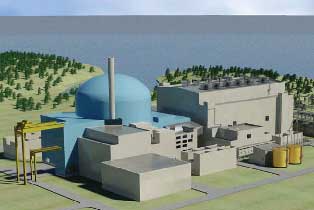Areva's EPR reactor is unlikely to receive design certification by the US nuclear regulator before the end of 2014, the agency has told the reactor vendor. Design certification for the EPR had earlier been targeted for June 2013.
 |
| An artist's impression of a plant based on the EPR (Image: Areva) |
Areva submitted its application for certification of the EPR design in December 2007 aiming to clear the way for reactors of that generic type to be built anywhere in America subject to site-specific licensing procedures and the issue of a combined construction and operating licence (COL). Four COL applications referencing the EPR have already been submitted to the NRC.
The NRC has issued a new review schedule to allow Areva to respond to outstanding technical issues previously raised by the NRC and to provide additional information related to new post-Fukushima requirements issued by the commission in February.
In a letter dated 21 May, the director of the NRC's division of new reactor licensing David Matthews told Areva: "Completion of the rulemaking by the end of 2014 will still present a challenge. However, NRC believes the enclosed schedule, while aggressive, is achievable with substantial management oversight and commitment from Areva to meet the established milestones with quality submittals that resolve identified technical issues."
Under the revised schedule, Areva is expected to submit to the NRC, by 30 August 2013, details about how the EPR design meets the post-Fukushima requirements and all outstanding technical issues should be resolved by 1 November 2013.
Matthews told Areva that there is "no margin" in the schedule to allow for the timing of "critical milestones" to be changed and still achieve certification by the end of 2014. He added, "While the staff has increased its attention to meeting the schedule, we will ensure that the design meets all applicable NRC regulatory requirements before we proceed to certification rulemaking."
In July 2010, the NRC highlighted two areas of concern related to the EPR design. These centred on design complexity and independence issues: each safety division within the system must be able to perform its function without relying on data from outside and must also be protected from adverse external influences. Areva needs to demonstrate to the regulator's satisfaction that these issues have been addressed, and show that data exchange between systems will not adversely affect safety.
Areva has already described proposed design changes intended to reduce the level of complexity as well as to address some of the intercommunication issues. However, Areva has notified the NRC of some areas where its feels that design changes are not advisable, and these appear to be the areas which the regulator feels may not meet its standards.
Researched and written
by World Nuclear News




_13505.jpg)
_87975.jpg)
_67826.jpg)
_87695.jpg)






